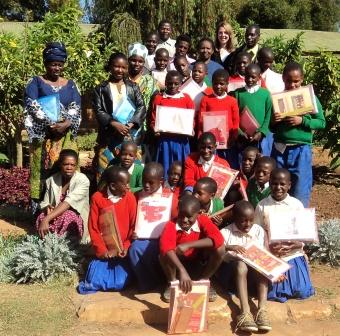Hi,
I just want to send you an email to give you an update on the project and also share a small story about an event that happened at the clinic that made my heart happy. I am sorry that it took this long to write, but I have been so busy here with preparations for the project, making materials etc...I am really enjoying Njombe and the community is so wonderful. I really understand why you wanted to continue work with this community.
So, just an update on the project. We started teaching our youth peer health educators yesterday (Saturday the 15th, October). It was really nice. It was about 9am when we started and the session took place at Nyumbanitu school. We started by personal introductions and introduction of the topics we will cover over the next few weeks, we did the pre-test questionnaire and played a few introductory games to get everyone acquainted. We made classroom rules for the teaching sessions and handed out our packages to the teachers and students, which contained out two books, a ruler, exercise books and pen and pencil.
I introduced some teaching about peer health education. We talked about roles and responsibilities of being a PHE, etc. We made it very interactive, asking the students lots of questions, for example: what they think peer education do and why they want to be and educator. They all took turns reading from the book and discussing. We wrote down important ideas on our flipcharts and had some pictures as well.
Betty did some nice teaching about reproductive health and reproductive organs of males and females, so that they will prepared to get teaching about HIV/AIDS in our future sessions. They were very good at answering questions and naming male and female body parts. I was very impressed with them and think we have a nice group of youth peer educators.
Everyone participated, the students, teachers, CHAKUNIMU, Betty and myself (in my broken Swahili). We had tea in the morning and lunch in the afternoon was provided for everyone. We finished at about 3:30 when we could tell that the students were getting tired and had enough teaching for one day. It was really a nice introductory day. Everyone worked hard and was involved.
I also just want to share one more story which is an example of how incredibly humble and wonderful the Njombe community is, how good the care is at this particular CTC and how incredibly lucky I feel to have the opportunity to be here at this time. Aside from my miscommunications, occasional frustrations and time recovering from illness, really it's all so worth it, and I feel like a part of this community as the people here have been incredibly welcoming since the day I got here.
So, as you know, the CTC is a small clinic at the TANWAT hospital. All the clients wait together outside on the benches for their appointments. Most of them come early in the morning. You can always here them talking, sharing, laughing and reminding each other if their name is called for their appointment. As for the facility, sometimes water and electricity can be a problem, even at TANWAT, which has a separate supply usually more reliable than the town's.
However, one particular week (I think 2 weeks agao), there was no running water for a few days at the hospital. Without anyone noticing, one of the taps in the CTC clinic was left in the on position, so during the night when the water supply had returned, it started to flood the clinic. When Betty came in the next day saw that there was water streaming underneath the clinic door. So, she went outside to tell her clients that they will be opening late today, as they had to clean up the mess before they could resume and see clients. However, the clients have known Betty a long time, and knew that she had surgery the previous year. So, to her surprise, they quickly got up and got to work to help with the cleaning, saying, "We will do the work, you are ill and you should not be bending like that."
"We are healthy, we come here and take our pills, we are not ill. We are perfectly healthy and we can do the work."
And they did.
It just shows the collaboration, rapport and partnership that exists between the clinician and clients at the CTC. They have known each other a long time and the care is reciprocal. The clients care about their CTC and the healthcare workers who treat them. They also care much about each other, and their own health and they will continue to come back for their care and treatment. They know that they are living healthy and productive lives, even with HIV and they know that they medications and care they receive keep them healthy, on top of that they are happy!! They are happy with their care and with their lives.
This clinic is an example of not only how other clinics and health facilities in Africa should be run, but how healthcare should be delivered worldwide. The openness and vigilance and care delivered at this small CTC in rural Tanzania in my opinion is first class, and beyond anything I would have expected before coming here.
Attached is a photo of Saturday's sessions with the students. Hope all is well back in Montreal.
Vesna
